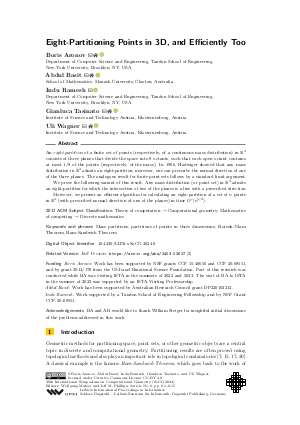Eight-Partitioning Points in 3D, and Efficiently Too
Authors
Boris Aronov  ,
Abdul Basit
,
Abdul Basit  ,
Indu Ramesh
,
Indu Ramesh  ,
Gianluca Tasinato
,
Gianluca Tasinato  ,
Uli Wagner
,
Uli Wagner 
-
Part of:
Volume:
40th International Symposium on Computational Geometry (SoCG 2024)
Part of: Series: Leibniz International Proceedings in Informatics (LIPIcs)
Part of: Conference: Symposium on Computational Geometry (SoCG) - License:
 Creative Commons Attribution 4.0 International license
Creative Commons Attribution 4.0 International license
- Publication Date: 2024-06-06
File

PDF
LIPIcs.SoCG.2024.8.pdf
- Filesize: 0.83 MB
- 15 pages
Document Identifiers
Related Versions
- Full Version https://arxiv.org/abs/2403.02627
Subject Classification
ACM Subject Classification
- Theory of computation → Computational geometry
- Mathematics of computing → Discrete mathematics
Keywords
- Mass partitions
- partitions of points in three dimensions
- Borsuk-Ulam Theorem
- Ham-Sandwich Theorem
Metrics
- Access Statistics
-
Total Accesses (updated on a weekly basis)
0PDF Downloads0Metadata Views
Abstract
An eight-partition of a finite set of points (respectively, of a continuous mass distribution) in ℝ³ consists of three planes that divide the space into 8 octants, such that each open octant contains at most 1/8 of the points (respectively, of the mass). In 1966, Hadwiger showed that any mass distribution in ℝ³ admits an eight-partition; moreover, one can prescribe the normal direction of one of the three planes. The analogous result for finite point sets follows by a standard limit argument.
We prove the following variant of this result: Any mass distribution (or point set) in ℝ³ admits an eight-partition for which the intersection of two of the planes is a line with a prescribed direction.
Moreover, we present an efficient algorithm for calculating an eight-partition of a set of n points in ℝ³ (with prescribed normal direction of one of the planes) in time O^*(n^{5/2}).
Cite As Get BibTex
Boris Aronov, Abdul Basit, Indu Ramesh, Gianluca Tasinato, and Uli Wagner. Eight-Partitioning Points in 3D, and Efficiently Too. In 40th International Symposium on Computational Geometry (SoCG 2024). Leibniz International Proceedings in Informatics (LIPIcs), Volume 293, pp. 8:1-8:15, Schloss Dagstuhl – Leibniz-Zentrum für Informatik (2024)
https://doi.org/10.4230/LIPIcs.SoCG.2024.8
BibTex
@InProceedings{aronov_et_al:LIPIcs.SoCG.2024.8,
author = {Aronov, Boris and Basit, Abdul and Ramesh, Indu and Tasinato, Gianluca and Wagner, Uli},
title = {{Eight-Partitioning Points in 3D, and Efficiently Too}},
booktitle = {40th International Symposium on Computational Geometry (SoCG 2024)},
pages = {8:1--8:15},
series = {Leibniz International Proceedings in Informatics (LIPIcs)},
ISBN = {978-3-95977-316-4},
ISSN = {1868-8969},
year = {2024},
volume = {293},
editor = {Mulzer, Wolfgang and Phillips, Jeff M.},
publisher = {Schloss Dagstuhl -- Leibniz-Zentrum f{\"u}r Informatik},
address = {Dagstuhl, Germany},
URL = {https://drops.dagstuhl.de/entities/document/10.4230/LIPIcs.SoCG.2024.8},
URN = {urn:nbn:de:0030-drops-199538},
doi = {10.4230/LIPIcs.SoCG.2024.8},
annote = {Keywords: Mass partitions, partitions of points in three dimensions, Borsuk-Ulam Theorem, Ham-Sandwich Theorem}
}
Author Details
- Department of Computer Science and Engineering, Tandon School of Engineering, New York University, Brooklyn, NY, USA
- Department of Computer Science and Engineering, Tandon School of Engineering, New York University, Brooklyn, NY, USA
Funding
- Aronov, Boris: Work has been supported by NSF grants CCF 15-40656 and CCF 20-08551, and by grant 2014/170 from the US-Israel Binational Science Foundation. Part of this research was conducted while BA was visiting ISTA in the summers of 2022 and 2023. The visit of BA to ISTA in the summer of 2022 was supported by an ISTA Visiting Professorship.
- Basit, Abdul: Work has been supported by Australian Research Council grant DP220102212.
- Ramesh, Indu: Work supported by a Tandon School of Engineering Fellowship and by NSF Grant CCF-20-08551.
Acknowledgements
BA and AB would like to thank William Steiger for insightful initial discussions of the problems addressed in this work.
References
- Pankaj K. Agarwal and Jirí Matousek. Dynamic half-space range reporting and its applications. Algorithmica, 13(4):325-345, 1995. URL: https://doi.org/10.1007/BF01293483.
- Boris Aronov, Abdul Basit, Indu Ramesh, Gianluca Tasinato, and Uli Wagner. Eight-partitioning points in 3D, and efficiently too. arXiv, 2024. URL: https://arxiv.org/abs/2403.02627.
-
David Avis. Non-partitionable point sets. Information Processing Letters, 19(3):125-129, 1984.

-
Pavle Blagojević, Florian Frick, Albert Haase, and Günter Ziegler. Topology of the Grünbaum-Hadwiger-Ramos hyperplane mass partition problem. Transactions of the American Mathematical Society, 370(10):6795-6824, 2018.

-
Pavle V. M. Blagojević and Roman Karasev. Partitioning a measure in ℝ³. Manuscript, 2016.

- Timothy M. Chan. A dynamic data structure for 3-D convex hulls and 2-D nearest neighbor queries. J. ACM, 57(3):16:1-16:15, 2010. URL: https://doi.org/10.1145/1706591.1706596.
-
Jesús A. De Loera, Xavier Goaoc, Frédéric Meunier, and Nabil H. Mustafa. The discrete yet ubiquitous theorems of Carathéodory, Helly, Sperner, Tucker, and Tverberg. Bulletin of the American Mathematical Society, 56(3):415-511, 2019.

-
Herbert Edelsbrunner. Edge-skeletons in arrangements with applications. Algorithmica, 1:93-109, 1986.

-
Branko Grünbaum. Partitions of mass-distributions and of convex bodies by hyperplanes. Pacific Journal of Mathematics, 10(4):1257-1261, 1960.

-
H. Hadwiger. Simultane Vierteilung zweier Körper. Archiv der Mathematik (Basel), 17:274-278, 1966.

-
Sariel Har-Peled. Geometric Approximation Algorithms. American Mathematical Society, USA, 2011.

-
Christian Knauer, Hans Raj Tiwary, and Daniel Werner. On the computational complexity of Ham-Sandwich cuts, Helly sets, and related problems. In STACS'11, pages 649-660, 2011.

-
Steven George Krantz. Handbook of Complex Variables. Springer, 1999.

-
Chi-Yuan Lo, Jiří Matoušek, and William Steiger. Algorithms for ham-sandwich cuts. Discrete & Computational Geometry, 11(4):433-452, 1994.

-
Jiří Matoušek. Using the Borsuk-Ulam Theorem. Springer Berlin Heidelberg, 2003.

-
Nimrod Megiddo. Partitioning with two lines in the plane. Journal of Algorithms, 6(3):430-433, 1985.

-
Edgardo Roldán-Pensado and Pablo Soberón. A survey of mass partitions. Bulletin of the American Mathematical Society, 2021.

- Micha Sharir, Shakhar Smorodinsky, and Gábor Tardos. An improved bound for k-sets in three dimensions. Discrete & Computational Geometry, 26(2):195-204, 2001. URL: https://doi.org/10.1007/S00454-001-0005-3.
-
Géza Tóth. Point sets with many k-sets. Discrete & Computational Geometry, 26(2):187-194, 2001.

-
Rade T. Živaljević. Topological methods. In Jacob E. Goodman, Joseph O'Rourke, and Csaba D. Tóth, editors, Handbook of Discrete and Computational Geometry, pages 551-580. CRC Press LLC, 3rd edition, 1997.

- F. Frances Yao, David P. Dobkin, Herbert Edelsbrunner, and Mike Paterson. Partitioning space for range queries. SIAM Journal on Computing, 18(2):371-384, 1989. URL: https://doi.org/10.1137/0218025.
